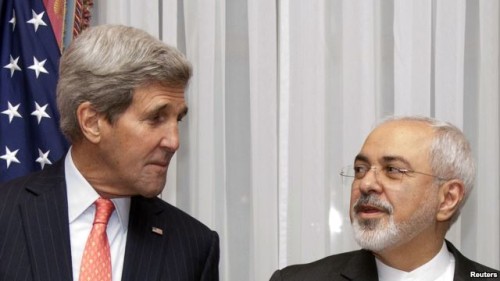PHOTO: Iranian Foreign Minister Mohammad Javad Zarif and US Secretary of State John Kerry, March 16, 2015
LATEST
- Parliament Advances Bill Putting Conditions on Nuclear Agreement
- Reports: Mass Layoff of Journalists at Iran’s Top Labor Newspaper
Iran’s Foreign Minister Mohammad Javad Zarif has bolstered Tehran’s signals that nuclear talks with the 5+1 Powers (US, Britain, France, Germany, Russia, and China) past the June 30 deadline for a comprehensive agreement.
Zarif said in an interview published in Iran on Saturday, “We believe that a good agreement should be reached so it means that we do not feel pressed for time.”
The Foreign Minister indicated that the agreement could be concluded within a few days of the deadline, which was set by Iran and the 5+1 as they passed the previous deadline for a resolution.
Political deputies from the two sides are currently in Vienna, in the eighth round of talks since a nuclear framework was announced on April 2.
Issues being debated for the final text of the deal include the status of Iran’s nuclear facilities and the amount of low-enriched uranium it can keep in the country; arrangements for inspections and whether these will include military sites; and the timing of the lifting of UN, European Union, and US sanctions.
See Iran Special: Reuters Q&A with Scott Lucas on Nuclear Talks and Tehran’s Next Steps
“We want to proceed with [the talks] until we reach a conclusion. This is, in my opinion, a better approach than extending [the negotiations to a date beyond early July],” Zarif said.
France has also indicated that the talks can go beyond June 30, but US and Russia are both still maintaining that agreement can be reached by the deadline.
On Monday, Zarif will meet French Foreign Minister Laurent Fabius and other European diplomats on the sidelines of an European Union foreign ministers’ summit in Luxembourg.
Fabius indicated the discussion would be a prelude to Foreign Ministers’ attendance as the negotiations approached the deadline:
Toward the end of next week the ministers will go [to the talks], so I’d like to have an explanation and conversation to see where the Iranians are.
We’re at a stage where the Iranians have to tell us what’s in their mind and I’ll explain to them that France wants a robust accord, but that means verifiable, because an agreement that is not verifiable is an agreement that is not implemented.
Zarif maintained Iran’s rhetoric of firmness and “red lines” for a deal: “We have proved that we will stand up to excessive demands.”
Reports: Mass Layoff of Journalists at Iran’s Top Labor Newspaper
Reports indicate that the Iranian Labor News Agency (ILNA) has laid off many of its journalists.
The pro-opposition Radio Zamaneh says that ILNA, the primary source for labor news in Iran, announced the dismissals in a short article. No reason was given.
Iran is in the midst of protests by workers across a number of sectors over pay and conditions. Thousands of teachers have been holding regular demonstrations, and factory workers have been rallying in front of Government buildings in Tehran.
On Tuesday ILNA reported that a man was killed accidentally as police fired tear gas on more than 350 workers who blocked a road in central Iran, protesting three months without employment.
Parliament Advances Bill Putting Conditions on Nuclear Agreement
The Iranian Parliament has given general support to a bill declaring that a nuclear deal will only be acceptable if it removes all sanctions — UN, European Union, and US — “on the very day when [the agreement] will take effect”.
The MPs voted 199-3 for the “safeguarding of nuclear achievements”, with 5 abstentions and 6 “present”.
Tasnim News’ report does not indicate whether “takes effect” means the day of signature of an agreement or a later date agreed by Iran and the 5+1 Powers.
The US has said that sanctions will only be removed when the International Atomic Energy Agency confirms Iranian compliance with the terms of the agreement.
Iranian hardliners, including the Supreme Leader, have said that all sanctions must lifted as soon as the agreement is signed; however, Iran’s chief nuclear negotiator, Deputy Foreign Minister Abbas Araqchi, indicated last week that the removal of some restrictions could begin some time after signature.
Parliament’s bill, which goes to a formal vote on Tuesday, also rules out any access to Iran’s military sites, and it refuses any restriction on Iran’s acquisition of nuclear technology for peaceful purposes or on research and development.
However, the conditions may prove to be just a bit of posturing with little practical effect. BBC Persian’s Amir Paivar notes that the Majlis accepts that authority still resides with the Supreme National Security Council:
While MPs seem to ban access to military sites, the bill underlines observing #Iran Supreme National Security Council directives. #IranDeal
— Amir Paivar (@amirpaivar) June 21, 2015

